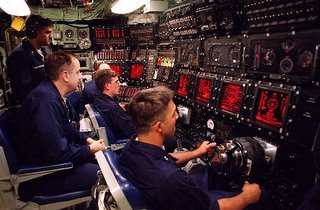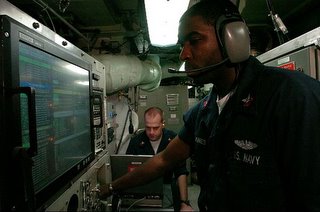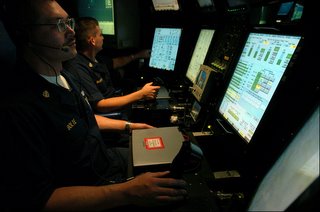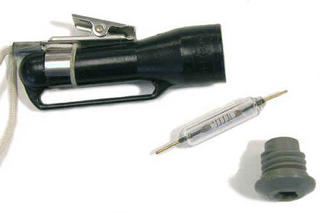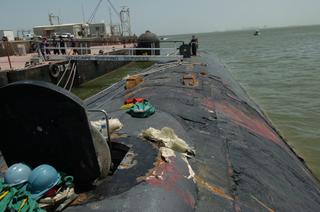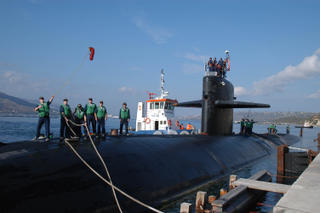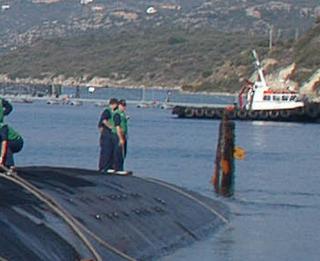This week's release of the
official NTSB report on the collision of USS Greeneville (SSN 772) with the Japanese fishing vessel
Ehime Maru in 2001, gave former Greeneville CO Scott Waddle a chance to
make the news again. I'll give my opinions on this report later on today...
Update 2245 23 Oct: I updated the links above to make them more relevant (the link to the statement from CDR Waddle now goes to the source article, and the link to "official NTSB report" now goes to the
official NTSB report).
Regarding the collision and my opinion of CDR Waddle -- it's clear that the crew of the
Greeneville, under the leadership of their then-CO, completely "screwed the pooch" that day in February 2001. Although a lot was made of the presence of "
civilians at the controls", that really didn't contribute to the collision. The main problem, IMHO, was a command climate in which the CO didn't encourage a questioning attitude and forceful backup by the crew.
I've never met Scott Waddle, and I only interacted with him once, so this is another one of those "one data point"** conclusions. When I was the Submarine Liaison Officer for the
John C. Stennis Battle Group back in 1999, the USS Greeneville was one of the subs playing OPFOR for our
JTFEX. We were having a hard time getting any good interactions with the
Greeneville after the first week; they had a "device" on board that all submarines participating in exercises carry, without which you really can't have decent contact between our submarines and surface/aviation units. We also had one certain ship that is specially designed to listen for submarines, and can tell immediately if this device is working properly. That ship reported that the device on
Greeneville wasn't working, so I relayed that to the sub. CDR Waddle replied back that they had verified that their device was working, so the problem was on our end. I told him a couple more times that this wasn't the case, unless the laws of physics had changed (I was actually more diplomatic than that). He still refused to believe the problem was on his boat, and so we eventually decided that we wouldn't even bother sending forces to look for
Greeneville -- it wouldn't be worth it, with the few days left in the exercise. (In his defense, these devices can be tricky; when I was a JO, we had the same problem on
Topeka, but every indication we had on board said the device was working. The difference is that we believed what everyone else was saying, and dug a little deeper until we found the problem.)
I figured that was the end of it, until I read an
article in Time magazine back in April 2001. (The article is "premium content" now, so unless you have access to that, you'll have to trust me that I copied the following passage correctly -- and you should trust me; after all, I'm a
Time subscriber.)
"...Waddle had always seen himself as destined to fight a war and told his men as much. In October 1999, in his first major sortie after taking command of the Greeneville, he took to sea off San Diego to fight a mock battle against the John C. Stennis carrier group. "They were one to two miles away, coming toward us at 18 knots--and we went up to periscope depth. I was taking my guys into the most dangerous peacetime situation. Any one of those ships could have ripped us apart. I told my men, 'We are going to engage these guys. If I go to war, you want to go to war with me, because I will put the enemy on the bottom and we will come home alive.' That's what gained me their confidence." It was typical Waddle--brash, daring, determined to succeed. He did a series of unorthodox maneuvers with the submarine to confound the carrier group. "They couldn't find us. We ran rings around them." So here he is, in an article about how sorry he is, bragging about his "tactical skill". Of course the Battle Group couldn't find him -- his device wasn't working. We wouldn't have been able to find any American sub in a similar condition. And he probably knew that -- I'm sure that Squadron told him after he pulled back in that his device didn't work. But he still couldn't resist trying to make himself look good. (As a side note: If he really did make a speech like that to the crew, you just know that they were probably smirking and rolling their eyes... saying stuff like that just isn't the submariner's way.)
That's the thing that bugs me about CDR Waddle. I'm glad he took responsibility for what he did -- it was the right thing to do. But, now that he's done so, I really don't see what the point is of seemingly making it
his life's work to
repeatedly talk about how he continues to take responsibility. He's
already said he's sorry. He's
visited Japan. He's written
his book. He's
griped about the Navy. The next step in the coping process is to quietly fade away...
Going deep...
** "One data point" conclusion:
If your sample size is one, your correlation will always be 1.0.
